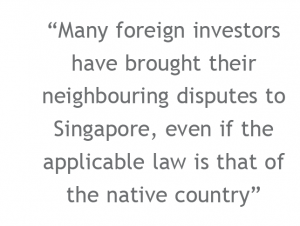Dispute resolution in Singapore is thriving more than ever
According to the 2017 annual reports of the Singapore Supreme Court and Singapore International Arbitration Centre, over 13,822 applications were filed in the Singapore Supreme Court; an all-time high of 452 case filings and 421 cases were also administered in that year. Established in January 2015, the Singapore International Commercial Court has just turned three, and its caseload continues to increase with time. Collectively, the above institutions have heard some of the most high-profile cases, which include Sanum Investments v the Government of the Lao People’s Democratic Republic; Kingdom of Lesotho v Swissbourgh Diamond Mines (Pty) Ltd; and PNG Sustainable Development Program Limited v Independent State of Papua New Guinea. These cases show that Singapore’s efforts to be a premier dispute resolution centre are paying off, and this trend is likely to continue in the foreseeable future.
Why Singapore?
Parties choose to resolve their disputes in Singapore for a variety of reasons, but one of the most appealing is the relative ease of enforcement of awards and judgments obtained through the Singapore legal system. It bears repeating that Singapore’s rule of law is substantially stronger than that found in the surrounding countries. Many foreign investors have brought their neighbouring disputes to Singapore, even if the applicable law is that of the native country. This  allows the plaintiff to have a dispute adjudicated in a neutral forum and enforce awards and judgments around the world if need be. This strategy works especially well when a defendant is a government, as trying to enforce local judgments against the government where the rule of law is weak can be fraught with all manner of difficulty, ranging from lack of jurisprudential sophistication to blatant political interference.
allows the plaintiff to have a dispute adjudicated in a neutral forum and enforce awards and judgments around the world if need be. This strategy works especially well when a defendant is a government, as trying to enforce local judgments against the government where the rule of law is weak can be fraught with all manner of difficulty, ranging from lack of jurisprudential sophistication to blatant political interference.
Increase of asset searches
In light of the above, it is clear that there are benefits to bringing disputes to Singapore. However, the process of enforcement requires one to not only think about where the dispute begins, but also where it ought to end. The reason for this is simple. Many parties who lose a dispute do not wish to pay and you have to compel them to do so through the legal process. This means that one often needs to conduct asset searches to ascertain a counterparty’s net worth in order to have some comfort that one can recover assets after a long-drawn legal battle. Some might say this is even more important than obtaining legal advice since an unenforceable paper judgment is of no use to anyone.
Not only is it prudent to conduct asset searches, it is also essential to know where such searches ought to be done. Money is fungible and can find its way to far-flung jurisdictions around the world, especially if a defendant is a fraudster seeking to conceal assets. Hence, one should build a global legal strategy around knowing where assets lie and where enforcement will take place. It is also important to have this strategy in place as early as possible (1) to prevent asset dissipation which invariably takes place soon after a dispute first arises and (2) to facilitate pre-dispute negotiations with a counterparty. These best practices apply in all jurisdictions, including disputes adjudicated in Singapore.
![]()
By Kwek Chin Yong, Associate Managing Director, Kroll
E: chinyong.kwek@kroll.com
W: www.kroll.com



















 Kroll
Kroll Tadashi Kageyama
Tadashi Kageyama







